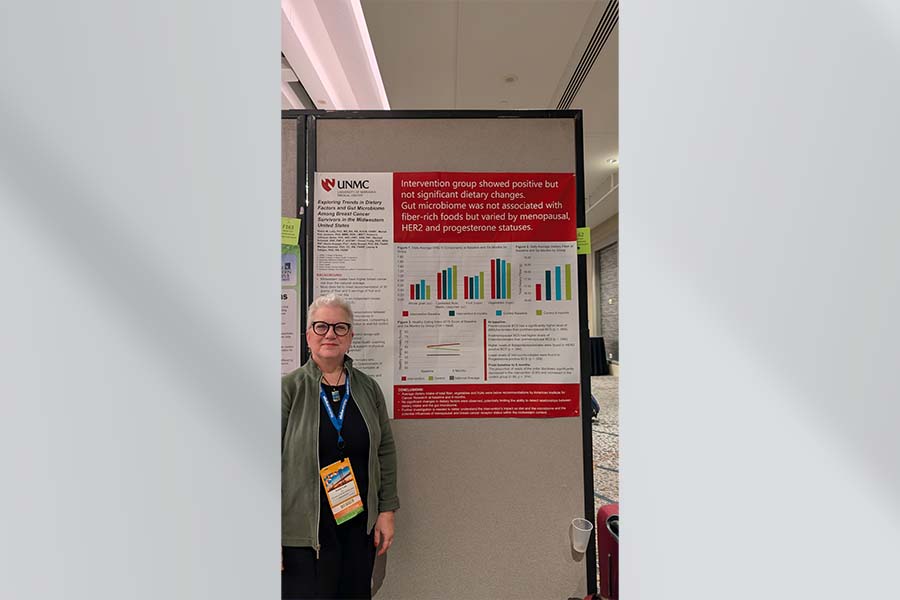Robin Lally, PhD, professor at the UNMC College of Nursing and director of the Center for Chronic Illness Self-management and Prevention (CRISP), is conducting two studies to support breast cancer survivors.
Dr. Lally, along with co-PI Rachael Schmidt, DNP, advanced oncology certified nurse practitioner with the Fred & Pamela Buffett Cancer Center, led the Nebraska site for the Comprehensive Outcomes of After Cancer Health (COACH) study. COACH, led by Pack Health, includes six National Cancer Institute-designated cancer centers to study the feasibility of engaging cancer survivors in digital health coaching. It also analyzes physical activity data and fecal microbiome samples.
The Nebraska site was the first to complete enrollment and began to analyze local data last fall. They started by looking at how breast cancer survivors’ diet and gut microbiota may be associated with menopausal status, cancer characteristics and cancer survivorship.
Mariah Jackson, PhD, assistant professor in the UNMC College of Allied Health Professions, co-investigator, said most diets fall short of recommended daily amounts of fruit, vegetables and fiber for cancer prevention and microbiome diversity.
“In our preliminary analysis, we wanted to know whether there were trends in breast cancer survivors’ dietary habits over the course of the one-year study,” Dr. Jackson said.
The team, which also included Becky Johnson Beller, PhD, research associate with the UNMC College of Nursing and Kevin Kupzyk, PhD, UNMC College of Nursing statistician, analyzed 38 breast cancer survivors who completed both dietary assessments and submitted both fecal samples over the first six months of the study.
The findings showed that Nebraska breast cancer survivors scored above the national average on the Healthy Eating Index, but were below the ideal daily levels of five servings of fruits and vegetables and 30 grams of fiber. The sample was too small to draw conclusions about microbiome diversity.
“Now that the data from all of the Nebraska participants is in, and other sites are beginning to complete data collection, we may combine efforts,” Dr. Lally said. “A larger sample may facilitate our ability to detect differences and better understand any associations with change in microbiota and menopausal status.”
Drs. Lally and Schmidt presented exploratory findings of the research at the Society of Behavioral Medicine’s 47th annual conference in San Francisco.
Dr. Lally, along with co-leader Juan Santamaria, MD, associate professor at the UNMC Department of Surgery and director of the Nebraska Breast Health Navigation Program (NBHNP), is conducting the IntegRating E-heAlth and Lay-navigation to OptimiZe TrEatment Initiation Adherence Among Black Women with Breast Cancer (REALIZE) study.
The REALIZE study addresses a critical health disparity. Although Black women are diagnosed with breast cancer at lower rates, they face a 40% higher mortality rate.
The team includes PhD student Kia Scott-Sellers and Rebecca Johnson Beller, PhD, from the UNMC College of Nursing, and breast cancer survivors Phyllis Mitchell-Butler and Julia Weathers, who serve as administrative navigator coordinators in the NBHNP. Dr. Lally recently presented her team’s abstract titled “Nebraska Breast Health Navigation Program Bridges Community, Clinical Care and Research to Promote Health Equity for Black Breast Cancer Survivors” at the 22nd annual American Psychosocial Oncology Society Conference, which highlighted the efforts of REALIZE.
The study provides early insights into how pairing newly diagnosed breast cancer patients with a peer breast cancer survivor from the local community can improve trust in the health care system, communication self-efficacy and treatment adherence among African American women with breast cancer. Early findings suggest the need for social support to help reduce fear and build confidence among breast cancer patients. Navigated women reported satisfaction with the program, which increased over time.
“The work resonated strongly with the APOS audience, a national gathering of professionals in psychology, social work and nursing who are involved in the work related to mental health and the quality of life of people with cancer,” Dr. Lally said.
“By continuously evaluating outcomes, the team aims to refine the program model and potentially expand its implementation, ultimately improving breast cancer care for Black women in Nebraska,” said Dr. Lally.
